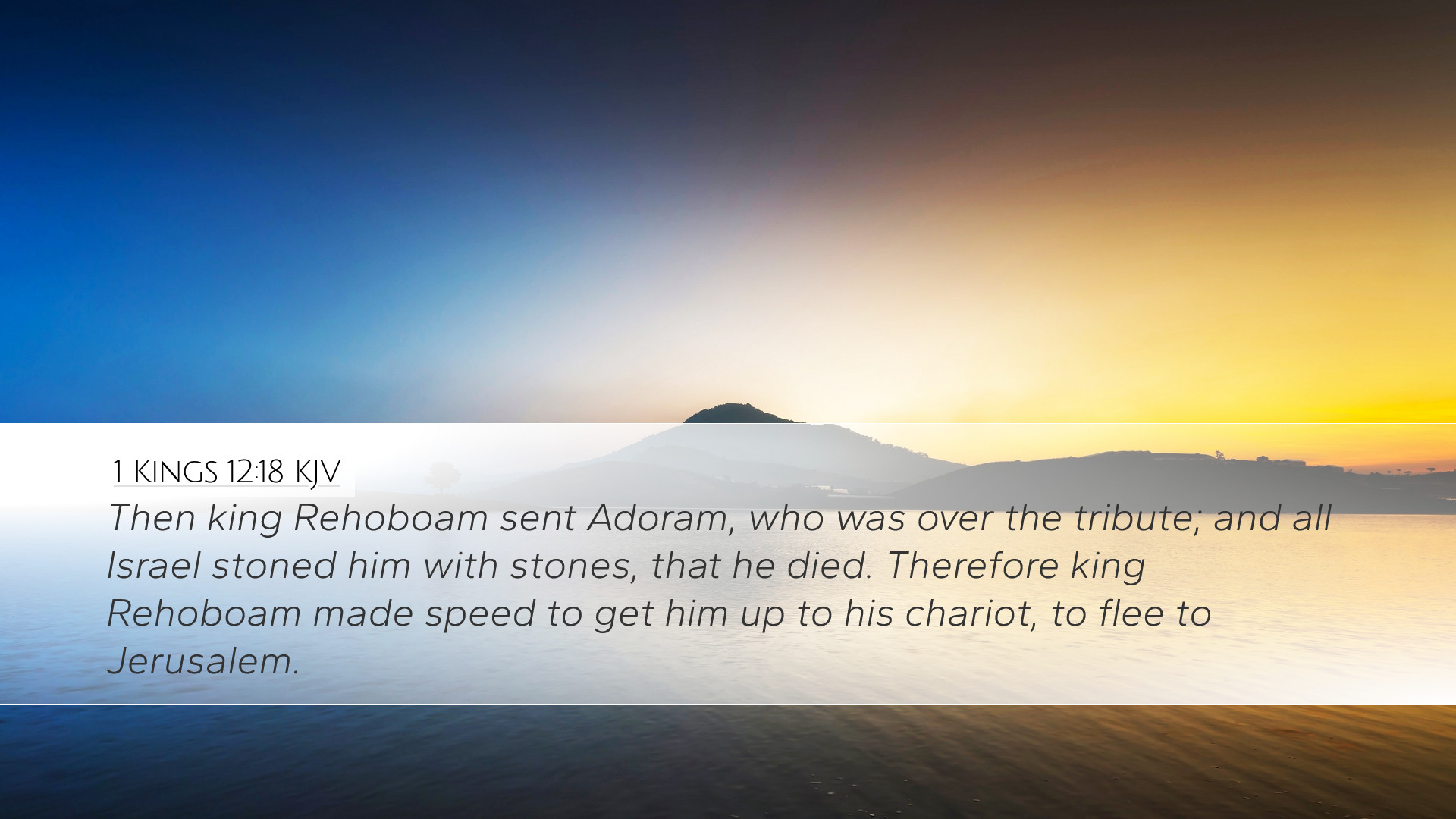Commentary on 1 Kings 12:18
Verse: 1 Kings 12:18 - "Then king Rehoboam sent Adoram, who was over the tribute; and all Israel stoned him with stones, that he died. Therefore king Rehoboam made speed to get him up to his chariot, to flee to Jerusalem."
Contextual Overview
The background of 1 Kings 12 provides critical insights into the divided kingdom of Israel and the pivotal decisions that would alter its trajectory. After the death of Solomon, Rehoboam ascended to the throne. He was met with a significant challenge from the northern tribes of Israel, who sought relief from the heavy tax burden imposed during Solomon's reign. The general discontentment among the people set the stage for Rehoboam's ultimate decision, which would seal the kingdom’s division.
Theological Significance
This verse serves as a crucial moment where the consequences of leadership and the effects of governance are vividly portrayed. The actions of Rehoboam symbolize a deeper spiritual lesson regarding authority, responsibility, and the repercussions of ignoring the collective voice of the people.
Commentary Insights
Matthew Henry's Commentary
Matthew Henry notes the haste with which Rehoboam responded, emphasizing that his decision to send Adoram as a representative reflected a profound misunderstanding of the people's sentiments. This intention to enforce tribute amidst discontent demonstrated a lack of wisdom, underscoring the need for leaders to be attuned to the prevailing sentiments of those they govern. Henry rightly observes that the aggression displayed by the people in stoning Adoram highlighted the severe divide between the ruler and the subjects. The act was not merely about tribute; it symbolized a rejection of regal authority.
Albert Barnes' Commentary
Albert Barnes elaborates on the character of Adoram, expressing that his role as a tax collector made him a target of the people's ire. Barnes posits that the stoning of Adoram represented a revolt against the established methods of governance that had been persistently oppressive. This act signified that the people were no longer passive in their dissatisfaction; they took drastic measures to voice their grievances. Barnes emphasizes Rehoboam's retreat as indicative of a fledgling leadership facing the reality of a fractured kingdom. The flight to Jerusalem illustrates a departure from authority in the face of dissent.
Adam Clarke's Commentary
Adam Clarke provides a theological reflection regarding Rehoboam's leadership failures. He points out that Rehoboam’s unwise decision to dismiss the counsel of the elder advisors shows a blatant disregard for wisdom and prudence. Clarke asserts that this moment of rebellion led by Rehoboam ultimately indicated a divine judgment that was prophesied earlier regarding the divided monarchy. Furthermore, he suggests that the abandonment of the people towards their king indicated a broader spiritual failure—the people's loss of faith not only in their king but in the covenant relationship established with God.
Lessons for Today
-
Importance of Listening:
This verse serves as a potent reminder of the critical necessity for leaders to listen to their constituents. Hearing and addressing the concerns of the populace is vital in maintaining stability and unity.
-
Consequences of Poor Leadership:
The rejection of wise counsel and the subsequent outbreak of violence illustrate the tragic outcomes that can arise from poor leadership choices, demonstrating that authority carries a weighty responsibility.
-
Divine Sovereignty:
Ultimately, the events in 1 Kings 12 reflect God's overarching control in the affairs of humanity. Rehoboam’s decisions were not made in isolation; they were part of a larger divine narrative regarding Israel’s fate.
Conclusion
1 Kings 12:18 presents a critical juncture in the narrative of Israel’s history, one that offers profound insights into leadership, community relations, and the divine. As pastors, theologians, and scholars reflect on this account, they are reminded of the delicate balance between authority and the governed. The consequences of Rehoboam's actions continue to resonate today, serving as an enduring lesson for all who bear leadership responsibilities.


